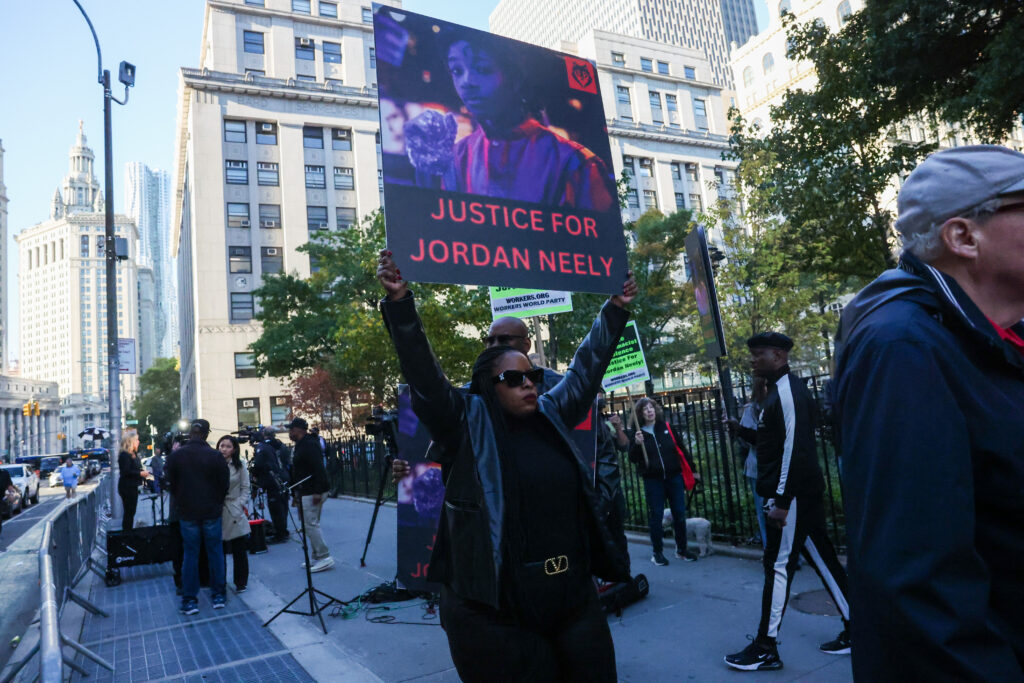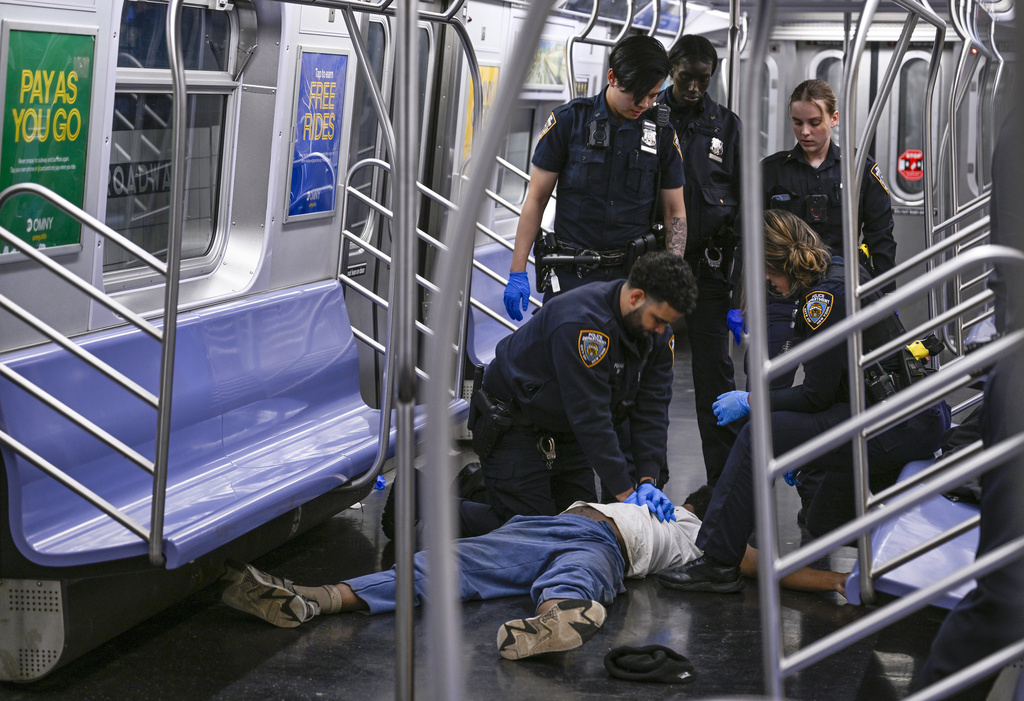Prospective Jurors in Marine’s Subway Chokehold Trial Are Asked If They Fear the New York City Subway
The voir dire process in the trial of Daniel Penny, charged with manslaughter, is well underway.

Prospective jurors began answering questions on their backgrounds and their own experiences on the New York City subway at the end of the first week of the trial of Daniel Penny, a Marine veteran who put a homeless street performer, Jordan Neely, in a fatal chokehold on the subway last year.
About 90 prospective jurors were called into the courtroom at Manhattan criminal court on Friday morning to begin voir dire, a process of questioning that will determine each potential juror’s suitability to judge the case impartially.
Judge Maxwell Wiley asked what neighborhood the Manhattan residents lived in, about their line of work, their hobbies, whether they or anyone close to them had been in the military, had studied martial arts or wrestling, or had experience with drug addiction, homelessness or mental illness. The most significant question, however, was if and how often the potential juror used the subway, and if that person had witnessed any outbursts or had felt threatened on the subway.
A native New Yorker, a woman, who has lived in Soho for 50 years and is retired (she asked the judge to speak privately about her line of work) said, she has not taken the subway, “not lately”, or not since the 1990s. “I take the bus,” she said, adding that in the 1980s, “somebody tried to take my jacket once. Very minor. I told him to get away and that was it.” The woman was excused from serving on the jury after attorneys from both sides huddled on the bench with the judge.
Another native New Yorker, who has lived on the Lower East Side for the last 4 year, and is an army veteran, had been the victim of a crime but also wanted to discuss those details in private. She told Judge Wiley she had experienced homelessness, to which he responded that he was “sorry to hear that,” and that she uses the subway “every day” to get to work, and has witnessed outbursts on the subway, but never felt personally harassed.

Out of 20 prospective jurors, 16 said on Friday that they never felt personally harassed or threatened, though the majority had witnessed outbursts on the subway. Eight people said they had felt scared.
As the Sun reported, the jury in this trial will be anonymous, meaning the jurors will only be referred to by number and not by name to shield their identity from the public.
The reason for the anonymity are threats against trial participants that have been received by both sides. The case is racially charged. Supporters of the victim, Neely, who was a 30-year-old African American man and well-known subway Michael Jackson impersonator, say that the defendant, Mr. Penny, used excessive force when he put Neely in a chokehold, and that Neely had not physically attacked anyone. Supporters of Mr. Penny, who is a 26-year-old,white ma and former infantry squad leader from West Islip on Long Island, call him a good Samaritan for trying to protect fellow subway passengers.
On May 1, 2023, according to some witnesses, Neely got on the train at the Second Avenue stop beneath Manhattan’s East Village and immediately began exhibiting threatening behavior, tossing his jacket to the ground and yelling that he was hungry and thirsty and “ready to die.” According to witnesses, Mr. Penny approached Neely from behind and placed him in a chokehold on the subway floor. Video footage filmed on the scene, which went viral after the incident and sparked outrage on all sides, shows Mr. Penny pinning Neely to the ground holding him in a chokehold. Two other passengers help Mr. Penny restrain Neely.

The street performer was pronounced dead at the hospital. A medical examiner ruled his death a homicide two days later.
Mr. Penny is charged with second-degree manslaughter and negligent homicide: combined these charges carry a maximum of 19 years behind bars. He has pleaded not guilty and told officers after the incident that Neely was acting erratically when he entered the subway car, and that he was trying to defend himself and other straphangers from what he perceived to be a dangerous assailant.
On Friday, Judge Wiley first instructed the prospective jurors on matters of the law, explaining, among other things, the legal term “beyond a reasonable doubt,” which refers to the standard of proof required to convict someone in a criminal trial, where the evidence must be so convincing that a rational person must accept it as fact.
The Manhattan district attorney, Alvin Bragg, who brought the case against Mr. Penny under pressure from social justice advocates, has to prove “beyond a reasonable doubt” that Mr. Penny acted recklessly when he put the 30-year-old Neely in the chokehold, which prosecutors allege he did for six-minutes, “well past the point at which Neely had stopped purposeful movement.” The prosecution does not have to prove that Mr. Penny intended to kill Neely.

“This is not an easy case… of a bad man doing a bad thing,” Assistant District Attorney Dafna Yoran told 16 prospective jurors, according to the New York Post. After the judge had finished asking his questions, prosecutors’ asked theirs. “It’s not easy finding someone guilty of killing somebody when you know they didn’t mean it,” Ms. Yoran explained. She asked the Manhattan residents if they felt they could be impartial even if they heard “nice things” about the defendant, like that he served in the U.S. Marines for four years.
“You’re not here to judge the defendant as a person … You are here to figure out what happened and did he commit this crime,” she emphasized, the Post writes.
The victim, Neely, who was homeless at the time of his death, had a long history of homelessness, mental illness, drug abuse and a criminal record of 42 arrests. According to filings, Neely had K2 in his system the day he died,” but it’s unclear how much. K2 is a synthetic drug also known as spice, which according to the Drug Enforcement Administration, can cause short-term, violent behavior.
Ms. Yoran said of Neely that he had “self medicated” with K2 and was “acting erratically and menacingly” on the subway before Mr. Penny grabbed him and held him in a chokehold, even wrapping his legs around Neely’s kicking legs to hold him still. “So he,” Ms. Yoran said about Neely, “is the one who really set (the incident) into motion.”

“It could be tempting to think he brought this upon himself and he’s responsible for his own death,” she added, according to the Post, but “under the law, all life is the same.”
The court learned that six prospective jurors had relatives or friends, who suffered from mental illnesses, and five people had personally experienced crimes. One person said, “our home was robbed.”
By the end of Friday, four prospective jurors had been excused from the case. 16 remained in the jury box but had neither been chosen nor dismissed. Friday’s voir dire moved forward slowly.
A young black man, a software engineer, who came to New York from Atlanta three years ago, was asked whether he could, if the evidence supports it, find that Mr. Penny was “reckless and unjustified” in his actions.

“It’s two people, but it’s one that you don’t really know in the moment what the person is going to do,” he pondered, the Post writes.
On Monday, defense attorneys will get their chance to ask the jurors their questions. The judge anticipates that jury selection will last throughout next week.

